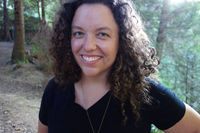Lenea Grace on Proving Canada Exists in Her Debut Poetry Collection
Lenea Grace's debut collection of poetry A Generous Latitude (ECW Press) leans into Canadiana by mining one of our traditional natural resources: wry wit. Her poems are smart and tight and their humour is the subtle, irreverent, occasionally heartbreaking variety so often grown north of the 49th parallel.
Weaving in everything from bears to beer to Guy Lafleur, Grace creates a funny, moving, and incredibly confident debut that is packed with unforgettable (and frankly cool) lines like the one she shares below: "I’m not smoking and it’s not analog, / but at 2 a.m., it is always 1979."
We're thrilled to have Lenea on Open Book today to take our Lucky Seven questionnaire, which poses seven questions about an author's new work to get to the heart of the book and the writing process.
Lenea tells us about the "invisible ropes" she examines in the collection, how the book partly began when she was challenged to prove that Canada even exists, and the importance of font loyalty.
Open Book:
Tell us about your new book and how it came to be.
Lenea Grace:
A Generous Latitude maps a series of relationships within a greater exploration of Canadiana and pop culture. Music both teases and generates the poems within the collection. Here, Guy Lafleur's hockey-disco hybrid album is on par with the Righteous Brothers and Fleetwood Mac. Here, "I'm not smoking and it's not analog, / but at 2 am, it is always 1979." Welcome to my psyche! Or at least my psyche at the time of creation.
OB:
Is there a question that is central to your book, thematically? And if so, did you know the question when you started writing or did it emerge from the writing process?
LG:
I’m primarily concerned with the human condition – the balance of high stakes emotion and the mundane, the preoccupations on repeat that follow us, and those invisible ropes tightening and tying us together. I’m often attracted to mediums that strike a balance between the hilarious and heartbreaking.
OB:
Did this project change significantly from when you first started working on it to the final version? How long did the project take from start to finish?
LG:
I did not set out to write about Canadiana, but moving to New York gave me some space to riff and play. A classmate at The New School challenged me to write a poem proving the existence of Canada (!?) – that project became “Proofs”, the first poem in A Generous Latitude.
Your CanLit News
Subscribe to Open Book’s newsletter to get local book events, literary content, writing tips, and more in your inbox
All that said, I wrote the bulk of A Generous Latitude in NYC from 2010-12, though there are outlier poems scattered throughout. By the time the book is published in April 2018, some pieces will be over ten years old.
OB:
What do you need in order to write – in terms of space, food, rituals, writing instruments?
LG:
I usually write late at night – always on a laptop, always typing, never longhand. I have to visualize the piece in print. And I like to be alone. I’ve never been one for group writing exercises – too much pressure to produce. I was about to say that I’m also not one for ritual, but I am loyal to my fonts. Every piece begins in Times New Roman and graduates to Garamond in its final form.
Music is a constant presence and driving force when I write. In the past year, stark duets have heavily influenced my work – Richard and Linda Thompson, Gillian Welch and David Rawlings, Clive Gregson and Christine Collister.
OB:
What do you do if you're feeling discouraged during the writing process? Do you have a method of coping with the difficult points in your projects?
LG:
I’m not a prolific or fast writer – I’ll sit on something for years before it materializes. So the entire process can feel tedious until I really get cooking. I’ll obsess over two lines for hours until finally I have to shelf it or sleep on it.
OB:
What defines a great book, in your opinion? Tell us about one or two books you consider to be truly great books.
LG:
Something I want to devour, read into the dawn, tell all my friends about, and read it again – wherein every sentence is a delight unto itself, a la Salman Rushdie and Martin Amis, Lauren Groff and Zadie Smith – and I’m only sad that I won’t experience it again for the very first time.
There are single poems that pack an entire book into a page or two – think of “Light” or “Letters & Other Worlds” by Michael Ondaatje. And there are books so beautiful and precise they function as a poem. See The Argonauts by Maggie Nelson.
OB:
What are you working on now?
LG:
For the past year, I’ve been working on a series of poems focused on the push and pull of a kind of magical realism where love exists on parallel planes, transcends through music and time – where the accidental becomes preordained. Here, we sit at separate breakfast tables in Toronto and in Houston, in 2018 and 1989. We invoke Emmylou, we invoke Gram. We skip the stairs two a time, sing that chorus again. Refrain.
_______________________________________
Lenea Grace’s work has appeared in Best New Poets, The Fiddlehead, Washington Square Review, CV2, Riddle Fence, Grain, and elsewhere. She is a graduate of McGill University, University of Maine at Presque Isle, and The New School. Lenea is a founding editor of The Mackinac poetry magazine. She grew up in Texas and Oklahoma, spending her summers at Long Lake and John Island in northern Ontario. She lives in Gibsons, British Columbia.





